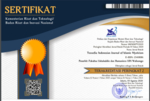collections_bookmark Focus and Scope
FOCUS
Teosofia: Indonesian Journal of Islamic Mysticism is a journal that provides an international scholarly forum for sustained discussion on Islamic mysticism from Islamic and other religious perspectives.
SCOPE
The subject covers textual or fieldwork studies of Islamic mysticism following various approaches. This journal accepts contributions from scholars on the following topics:
- Sufi Orders (Tariqas)
- Living Sufism
- Eco-Sufism
- Sufi Thought and Doctrine
- History and Area Studies of Sufism
- Sufi Manuscripts
- Sufism and Art
- Sufism and Healing
- Interdisciplinary Study of Islamic Mysticism
create_new_folder Section Policies
Articles
device_hub Peer Review Process
Teosofia: Indonesian Journal of Islamic Mysticism follows a double-blind peer review process with a minimum two reviewers. The editors review the submitted manuscripts according to the journal guidelines. These submissions are systematically processed as follows:
Step 1: Authors are notified automatically within 24 hours of their submission.
Step 2: The manuscripts are assigned to the editors within seven days. If the number of articles submitted to the journal is higher than usual, this may take longer.
Step 3: The editors assess whether the manuscripts follow the author guidelines or not and reject those that do not fulfil the standart requirements.
Step 4: Manuscripts that need minor revision are returned to the authors who need to submit a revised version of their manuscripts within seven days upon receipt.
Step 5: The revised manuscripts (without the authors’ name and affiliation) are forwarded to at least two reviewers. The reviewers either complete a review form or add their comments directly. The review process takes a maximum of 28 days.
Step 6: The editor will notify the authors if their manuscripts need further revision. The authors must upload the revised manuscript within 14 days. If the revised manuscript has been amended to incorporate the reviewers’ suggestions, it is accepted for publication (copyediting, layout, and proofreading).
event_note Publication Frequency
This journal is published twice a year (June and December).
copyright Open Access Policy
This journal provides an immediate open access to its content. This is based on the principle that research should be freely available to the public and support the global exchange of knowledge.
unarchive Archiving
Teosofia: Indonesian Journal of Islamic Mysticism utilizes the Public Knowledge Project Private LOCKSS Network (PKP-PLN) to create a distributed archiving system among participating libraries, which are permitted to create permanent archives of the journal for purposes of preservation and restoration. Read More
bookmark_border Publication Ethics
Teosofia: Indonesian Journal of Islamic Mysticism is published twice a year by the Faculty of Ushuluddin and Humanities, State Islamic University (UIN) Walisongo Semarang Indonesia as a double blind-reviewed journal. The journal is available online and as printed version. This section highlights the ethical conduct expected by all parties taking part in the process of publishing any article in this journal (i.e., authors, editor-in-chief, editorial board, reviewers, and publisher).
Publication Ethics and Malpractice Statement
The publication of an article in Teosofia: Indonesian Journal of Islamic Mysticism echoes the quality of the work of the authors and the institutions that support them. Each article is peer reviewed. The reviewers critically evaluate its content and check whether it adheres to scientific standards. All parties involved in the publication process must act ethically. In its role as publisher the Faculty of Ushuluddin and Humanities is solely responsible for supervising all stages of publication and recognizes its ethical and professional responsibilities. The publisher is strongly committed to guarantee that advertising, reprinting, and other commercial expenses have no impact or influence on editorial decisions.
Publication decisions
The editors of Teosofia: Indonesian Journal of Islamic Mysticism decide which of articles submitted to the journal should be published based on their authentication as original contributions and their significance to the wider research community. The editors and reviewers are guided by the policies of the journal’s editorial board and controlled by such legal requirements as in force regarding libel, copyright violation, and plagiarism.
Fair play
In giving any appraisal of manuscripts for their intellectual content the editors must not be influenced by ethnicity, gender, sexual orientation, religious belief, citizenship, or the political views of the authors.
Confidentiality
The editors and any editorial staff must not make any information related toa submitted manuscript to anyone other than the corresponding author, reviewers, potential reviewers, other editorial advisers, and the publisher.
Disclosure and conflicts of interest
Unpublished materials concealed in a submitted manuscript must not be used in an editor’s own research without the direct written approval of the author.
Duties of Reviewers
Contribution to editorial decisions
Peer review helps the editorial team to make their decisions and may assist the author in improving the paper through editorial communications.
Promptness
Any nominated referees who think that they are inappropriate, due to their lack of skill, insight, or knowledge to review the research work reported in a manuscript should notify the editor and excuse themselves from the review process.
Confidentiality
Any manuscripts received for review must be regarded as private and confidential documents. They must not be shared or discussed with third parties except with the editor’s knowledge and approval.
Standards of Objectivity
Reviews should be carried out objectively. Personal criticism of the author is inappropriate. Referees should state their views clearly and present supporting arguments.
Acknowledgement of Sources
Reviewers should recognize and ascertain a relevant published work which has not been quoted by the authors. Relevant citations should be provided for any statement from observation, derivation, or argument that has been previously reported. Furthermore, the reviewers and editors have to be concerned with any substantial similarity or overlap between the manuscripts under consideration and any other published paper of which they have personal knowledge.
Disclosure and Conflict of Interest
Any private data or confidential information found during the peer review must be kept off the record and not be used for individual benefit. Reviewers must be objective and should not evaluate manuscripts in which they have conflicts of interest resulting from competitive, collaborative, or other relationships or connections with any of the connected authors, companies, or institutions.
Duties of Authors
Reporting standards
Reports or original research should be presented accurately and objectively, and primary data should be demonstrated truthfully. Each paper should include the necessary information and references to allow others to copy the work. Deceitful or significantly inaccurate statements are inexcusable and regarded as unethical.
Originality and Plagiarism
The authors must confirm that they have written completely original works. If the authors have used the works and/or words of others, they must be appropriately cited or quoted.
Multiple, Redundant or Concurrent Publication
Authors must not submit the same manuscript or manuscripts that present in essence the same research work to more than one journal or primary publication. Any such act is not tolerated and deemed as violating ethical publishing behavior.
Acknowledgement of Sources
Proper acknowledgment of the work of others must always be provided. Authors must make explicit mention of publications that are prominent in defining the nature of the reported work.
Authorship
Original authorship involves those researchers who have accomplished a major contribution to the conception, design, execution, or interpretation of a reported study. All those who meet these criteria should be listed as co-authors. If others have taken part in certain essential aspects of the research project, they should be approved or recognized as contributors. The corresponding authors are responsible for making sure that all appropriate co-authors are properly acknowledged, have viewed and accepted the final form of the paper, and have agreed upon its submission for publication.
Disclosure and Conflicts of Interest
All authors are committed to reveal in their manuscript any financial or other basic conflict of interest that may have influenced the results or interpretation of their research work as presented in the manuscript. All basis of financial sustenance for the project should be unveiled.
Fundamental errors in published worksWhen authors find a significant mistake or error in their own published work, it is their duty to promptly report this to the journal editor or publisher. They must cooperate with the editor to withdraw or correct the paper accordingly.
bookmark_border Allegation of Research Misconducts
Research misconduct means fabrication, falsification, citation manipulation, or plagiarism in producing, performing, or reviewing research and writing an article or reporting research results. When authors are found to have been involved with research misconduct or other serious irregularities pertaining to articles that have been published in other scientific journals, the editors have a responsibility to ensure the accuracy and integrity of the scientific record.
In cases of suspected misconduct, the editors and editorial board will use the best practices of COPE to resolve the complaint and address the misconduct fairly. This will include an investigation of the allegation by the editors. A submitted manuscript that is found to be the product of such misconduct will be rejected. In cases where a published paper is found to contain such misconduct, a retraction will be published and linked to the original article.
Step 1:
The first step of this process involves determining the validity of the allegation. An assessment is made whether the allegation is consistent with the definition of research misconduct. This initial step also involves determining whether the alleged individuals have relevant conflicts of interest.
Step 2:
If scientific misconduct or the presence of other substantial research irregularities is a possibility, the allegations are shared with the corresponding author, who is requested to provide a detailed response on behalf of the co-authors.
Step 3:
After the author’s response is received and evaluated, an additional review is done, possibly with the involvement of experts (such as statistical reviewers).
Step 4:
In cases where it is unlikely that misconduct has occurred, clarifications and/or additional analyses are published as letters to the editor. However, a correction notice may suffice.
Institutions are expected to conduct an appropriate and thorough investigation of allegations of scientific misconduct. Ultimately, authors, journals, and academic institutions have the obligation to ensure the accuracy of the scientific record. By responding appropriately to concerns about scientific misconduct and taking necessary actions based on evaluation of these concerns, the journal will continue to fulfill the responsibilities of ensuring the validity and integrity of the scientific record.
Retraction
A paper published in Teosofia: Indonesian Journal of Islamic Mysticism will be retracted in the following conditions are fulfilled:
- There is clear evidence that the findings are unreliable, either as a result of misconduct (e.g., data fabrication) or honest error (e.g., miscalculation or experimental error)
- The study has previously been published elsewhere, without proper cross-referencing, permission, or justification (i.e., cases of redundant publication)
- It constitutes plagiarism
- It reports unethical research
The mechanism of retraction follows the Retraction Guidelines of the Committee on Publication Ethics (COPE), which can be accessed at https://publicationethics.org/files/retraction%20guidelines.pdf.
bookmark_border Revenue Sources, Advertising, and Direct Marketing Policy
Revenue Sources
The operations of Teosofia: Indonesian Journal of Islamic Mysticism are funded by the Ministry of Religious Affairs Republic of Indonesia, through Daftar Isian Pelaksanaan Anggaran (DIPA) of Universitas Islam Negeri Walisongo Semarang, Indonesia.
Advertising
Teosofia: Indonesian Journal of Islamic does not accept advertising from any parties.
Direct Marketing
In promoting the journal and the results of publications to the public, the journal does not wish to act in ways that are detrimental to other parties (e.g., spreading spam) or share misleading information with prospective authors and publishers.
bookmark_border Screening for Plagiarism
The articles submitted to Teosofia: Indonesian Journal of Islamic Mysticism will be filtered using Turnitin, which must be a maximum 20% of similarities.
Plagiarism includes:
- Word for word plagiarism – borrowing another author’s language word-for-word without identifying the text by using quotation marks nor citing it correctly.
- Source plagiarism —using the ideas of others without giving enough recognition or mentioning the source explicitly.
- Plagiarism of authorship — presenting another author's work as one’s own.
- Self-plagiarism —authors publishing one article in more than one journal (i.e., ‘recycling’ papers). When citing one’s own work, the new article produced must contain significant changes. This means that the former article constitutes only a small part of the new article produced.






.png)



